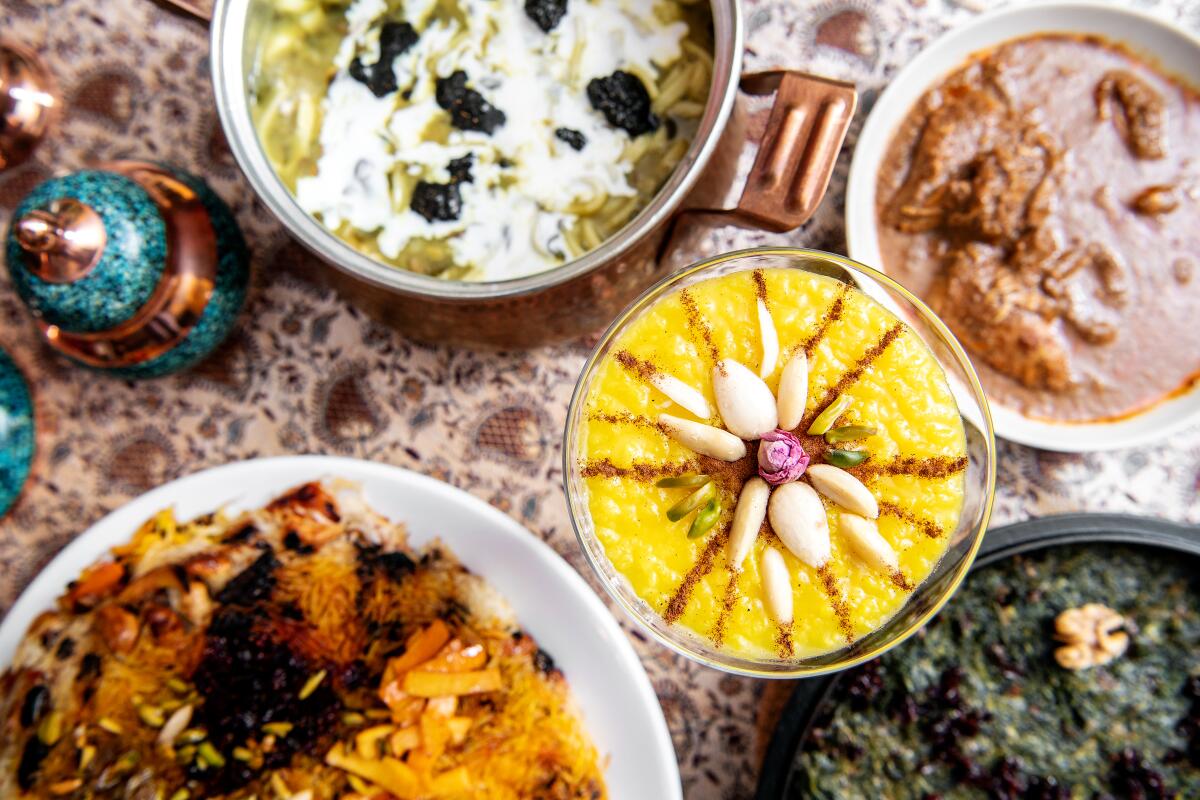My mother has been a citizen diplomat

- Share via
When we moved to California in 1972 for my father’s two-year engineering assignment, my mother came ready with a suitcase full of presents. Long before Oprah gifted her entire audience with brand new cars, my mother gifted every American who crossed our path with some tchotchke from Iran.
No American was safe from my mother’s determined gift giving. Our elderly neighbor received a Persian miniature; she in turn gave us a Creeping Charlie plant which grew and grew and grew. We definitely got the better deal in that exchange. The mailman got a keychain. My teacher got a small Persian rug. My crossing guard received a leather wallet.
My friends’ parents received either miniatures, small boxes with inlay or devices that looked like they were for smoking something illegal. My mother’s gift suitcase was like Mary Poppins’ travel case; it never ran out of gifts and no American was deemed unworthy of this cultural bridge building.
Among this endless supply, my mother had also brought a large selection of Persian clothing. I had literally never seen anyone in Iran wear the stuff that she brought. There were unflattering paisley caftans, and many, many vests, some with leather trim, others with sheep skin with a very strong odor of sheep. Let me state that Persian textiles are among the most beautiful in the world and should I ever have a chance to visit Iran without the danger of being thrown in jail for being a writer, I will return with suitcases full of textiles, especially all things paisley.
However, the stuff my mother brought was not in style during the early 1970s in Whittier, where we lived, or anywhere at that time, with the possible exception of Berkeley in the ‘60s.
Whenever my mother, with the best of intentions, gifted one of these items of clothing, usually a vest, I was with her, reluctantly translating. Even though my mother left the talking to me, she always added three words at the end, in her heavily accented English, “From my country.”
I cringed as my mother constantly reminded people that we were from somewhere else. Our unpronounceable names with their abundance of syllables and too many Zs were already a dead giveaway. I did not want to be a citizen diplomat.
Days after gifting an item of clothing, my mother would often ask me if I had seen the recipient wearing the gift. I wanted to lie and say yes but I also wanted her to stop gifting the clothing. For a second-grader trying to blend in, the routine had gotten embarrassing. It wasn’t just the overpowering odor of sheep emanating from underneath the gift wrap, but also the confused look on the recipients’ faces, a look that combined the question, “What is this?” with the fear of attracting rogue sheep.
I didn’t understand at the time that my mother’s actions had a noble purpose: She wanted Americans to like us. She wanted them to know that we were good people from a good country. All I knew is that nobody in my neighborhood had ever heard of Iran and I certainly did not think my mother’s efforts were giving us a good name.
By the time the suitcase of gifts was emptied, it was time for us to return to Iran. Two years later, another engineering assignment brought us back to California, but this time, Middle Eastern markets were slowly sprouting around us. With the availability of ingredients, my mother’s bridge building took a new turn into the culinary arts. I am sure that if her cooking were shared today, most people would embrace the new flavors but Americans in the early ‘80s were not into exotic Middle Eastern food. At that time, we were living in Newport Beach, where people drank Tab and the most popular low-calorie bread turned out to have wood pulp as an ingredient.
For this crowd, my mother was making fesenjoon, a divine stew of pomegranate syrup and walnuts, served on a bed of buttery white rice. As if the caloric count was not enough to scare the Buns of Steel crowd, the visuals sealed the deal. Fesenjoon, that delicious slowly cooked dish served at weddings and special occasions, looks exactly like mud.
It never occurred to my mother that someone might not try her food. She insisted on making Persian food for all community and school potlucks, always asking me about people’s comments. Back then, exotic meant tacos; the learning curve was simply too steep.
Now that I am older than my mother was when she came to America, I look back at her efforts with much kinder eyes. She may have misjudged what Americans would wear or eat but she simply wanted our tchotchkes and vests and food to start conversations. I get it. It’s 2021 and I continue to try to do, albeit now willingly, what my mother started in 1972.
We are all citizen diplomats whether we want to be or not, either uniting or dividing with our words. It only takes a few sound bites for politicians to belittle entire communities but it’s up to ordinary people to either continue the division or to heal the rifts.
Let’s find excuses to begin conversations, real ones in person, and keep talking until we see that our commonalities far outweigh our differences, because they do. My mother was simply ahead of her time.
Firoozeh Dumas is a writer living in Palo Alto. She is the author of “Funny in Farsi” and “Laughing Without an Accent.”
More to Read
A cure for the common opinion
Get thought-provoking perspectives with our weekly newsletter.
You may occasionally receive promotional content from the Los Angeles Times.






